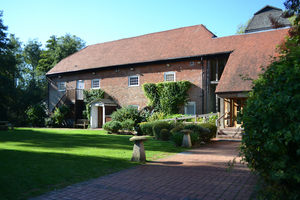Interview: Paul Hart Discusses The Socially Distanced Summer Season at The Watermill Theatre
Watermill Summer Season

Paul Hart is the Artistic Director of Newbury's Watermill Theatre, which was one of the first theatres to announce a programme of socially distanced outdoor shows this summer.
They have already started performances of a brand new play, The Hound of Baskervilles, and a concert version of Lerner and Loewe's musical Camelot, with actor-musicians, is due to follow. We spoke to Paul about the process of putting together these shows so quickly, COVID-19 safety measures, and how the Watermill is surviving the pandemic.
How have the first performances of The Hound of Baskervilles gone so far?
Really good! We didn't really know what to expect, especially with a comedy in terms of the audience's reaction and how the actors would be able to bounce off that. We knew it was going to be very different, so it's been interesting getting a sense of all that. It's so lovely to have people be able to sit on the back lawn. They come and they have dinner beforehand and it's a lovely atmosphere. Then they stay at their tables and are entertained for the evening!
Have you altered your outdoor area much for this summer season?
Yes - the production team had to build the whole stage area, as well as the stuff that's specific to the production. So it's been a major build and a quick turnaround to construct an outdoor theatre. We've never done that specifically. We've had bursts of shows outside but never turned ourselves into an amphitheatre, so that's been quite a challenge.
Is this something you think you might like to continue for summers in the future?
It's such a lovely thing that it has made me think there is more that we can do. Obviously, it's very small compared to our normal capacity, so it's difficult in that way. Like everyone, I get terrified of outdoor theatre because you just spend the whole summer looking at the weather reports and thinking "God, let's get through this!".
Could you share with us the process you went through to put together The Hound of Baskervilles so quickly after the Government's announcement?
It was three weeks from the announcement that outdoor theatre could happen and our usual rehearsal process is four weeks. And then there's casting, designing and writing a script ahead of that. I went to the cast and the director and said "Let's try and do something that has our own mark, rather than doing something that already exists".
It felt really important to acknowledge the time we're living through and not pretend that those things won't be playing on people's minds in terms of how it's all going to work and the specifics of how the performance plays out. So we decided to devise from something that exists, as that gave us a chance to have the structure in place. We threw around some ideas on Zoom over a couple of days, and then we brought the cast up here and they had about a week on site to put those ideas together and stage it.
So yes, it was a really quick turnaround, but they did such a brilliant job. The key thing for us was choosing the right people who wouldn't be freaked out by that, and would embrace that sense of fun. They're able to go back to their scripts - we have bound scripts on stage in case they need that support, but they hardly ever use it. Apart from the bit of narration they learnt everything and worked incredibly hard to pull this off. And it's an amazing show - it looks like it's had four weeks' rehearsal! I'm delighted that it paid off.
We used as much as we could from our stores in terms of props and costumes, and it's been amazing to be able to give some freelancers some work as well. Everyone I phoned up was like "That sounds mad", but they were up for it, which was the only way we made this happen.

Would you say you had a bit of a plan in place before the Government's announcement?
Yes, definitely. The worry I had was that we might run out of time. We knew that we could do it safely but we needed the time to turn it around, put those safety measures in place and come up with a show. It was always going to be really tight, and if it had happened any later we would have been in serious jeopardy. The last three weeks have been absolutely mental. Any less and I don't think we would have been able to do it. If the announcement had happened earlier, I think more people would have been able to make plans.
Camelot traditionally has quite a large cast and orchestra - how are you going about casting this in the current difficult climate?
We're trying to be as inclusive as we possibly can, and looking at graduates because it's obviously been such a tough time for them. But we're also looking at people who are established and really need the work at this time. We cast a lot of actor-musicians and have an understanding of how that can work, but we're doing it on a much tighter timeline than usual.
It's about finding people who we think will have the ability to get their heads around the score very quickly, but also to engage with them as safely as possible. It's a massive challenge from a casting point of view. To be honest, it's the sort of challenge we're used to - finding those people who are so multitalented. It's a cast of ten and most of the process is over phone calls - that's the new world!
Did you already have the rights to Camelot prior to the Government's announcement?
No, we didn't actually. I've wanted to do Camelot for ages. We were looking at this reduced cast version that had been on in America before, and I'd really fallen in love with it. So I was quite far down the line in terms of thinking about it. When we were thinking we needed something outside and that it would be nice to do a concert and something new, rather than bringing back one of our old shows, it was like: well, this makes sense!
So we approached them to see if they'd be up for it and they were amazing in turning it around really quickly in terms of getting permission from the estate. Hence why we were able to move really fast. And it's perfect for outside! Camelot is a beautiful location somewhere in England or Wales, and there's so much in it to do with magic and nature.
Can you explain what social distancing measures you have in place to ensure the safety of the audience, cast and staff?
All the cast and staff are social distancing throughout. The audience are on separate tables at a two-meter distance - so you buy a table and then you know you're isolated in that group. Then food and drinks are ordered and brought to the tables. We've made an epic one-way system around the building, so we're controlling traffic all the way through. As Camelot is a concert version, people are able to be a lot more static, so that will help a lot with social distancing.
But in The Hound of Baskervilles, the stage is literally marked out into grids so the actors can keep an eye on how close they get to each other. As part of the show, there's also a screen that comes on at one point so they can have an intimate scene with that between them. There's parts where they put on gloves and masks, and there's moments that we've worked into the show where they have to sanitise the props as well. So we really make that a part of the experience and what audiences see in front of them. Although the show is quite fun, it's important that we're promoting all of those things as well.
Could you explain to us the impact this pandemic has had on the Watermill Theatre and the individuals who work for it, as well as what your plans are to stay afloat after the summer?
Well, it's been a really scary time as you can imagine, and I think you're right to point out that the staff have especially been affected by everything being so uncertain. When this started, none of us anticipated this being so long term. It takes quite a lot of work to shut down the building, so that first phase was just trying to shut down and save costs.
Then, the whole time for me has switched to figuring out how we can have a recovery plan in place - and obviously that's had to shift along with guidance and changing timelines - but just working out the strategies on how we stay afloat and how we keep our staff on. I think because we're such a small organisation, if we lost any of our staff it would take us longer to rebuild. It's kind of a catch-22.
In terms of our plan for long-term survival, it's been really key for us to get open early and to work out how the building operates in this new way. We're keen to keep pushing on and to get audiences safely back into the theatre. We really hope to get the theatre open again before the end of the year, even with social distancing in order, to keep on learning what works and what doesn't and to be able to start generating some income ourselves.
So as well as big fundraising pushes - which the team here have done an amazing job at - we're making sure people are aware of the situation we're in. That's going to be really crucial going forward: keeping audiences informed as to when they might be able to come back.
We're just hoping that the sooner we can get back to full production, the better a chance we stand of minimal affect on the organisation. Our focus is really on getting back to that stage as quickly as possible. It's a big bonus for us to be able to do this outdoor season. It's an absolute lifeline.
Performances at the Watermill Theatre run until 29 August
Photo credit: Eden Harrhy
Comments

Videos

